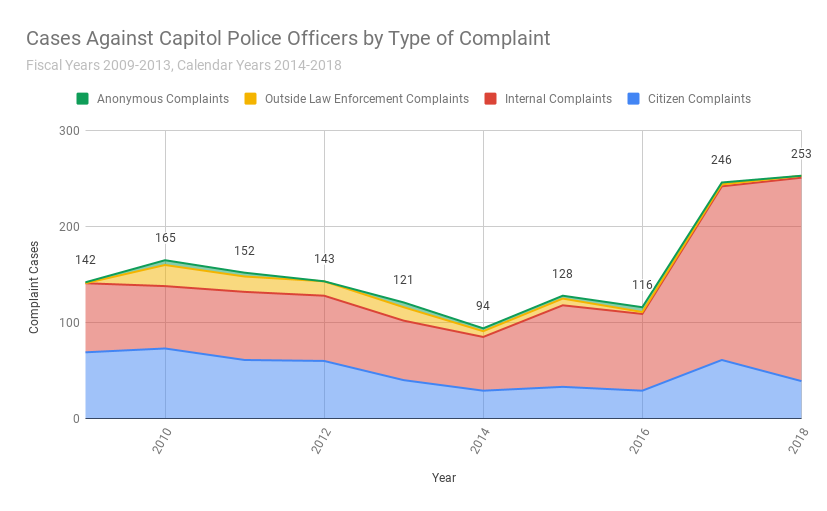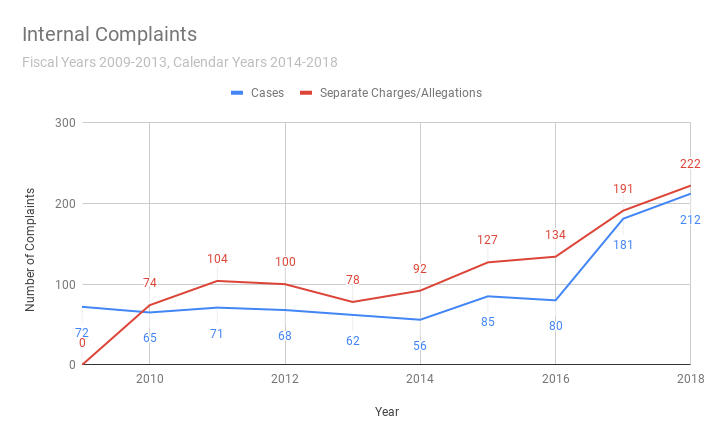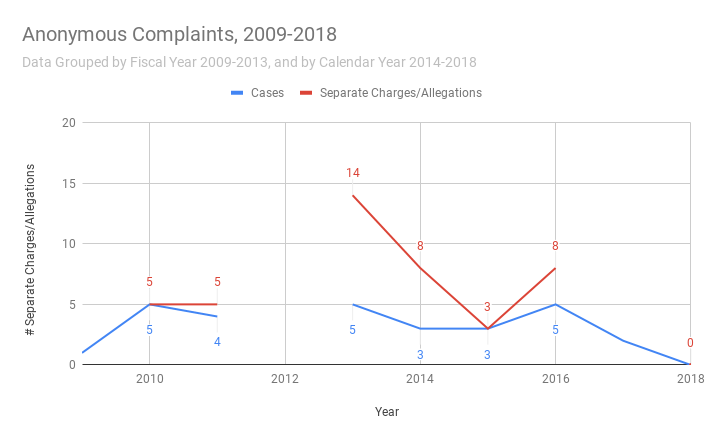Demand Progress obtained ten years’ worth of reports summarizing complaints against U.S. Capitol Police (USCP) employees. According to the data:
• Total complaint cases are up by almost 70% in the last decade. USCP reported 151 complaints in fiscal year (FY) 2009 compared to 253 complaints in calendar year 2018. We should note that the number of USCP officers has also significantly increased over that time: the department has 1,799 full time employees in FY 2009 compared to 2,283 at the start of FY 19.
• Internal complaint cases have more than doubled since 2016. USCP reported 212 internal complaint cases in 2018: that’s a 118% increase from the 80 reported in 2016 and a 226% jump from the 65 reported in FY 2010. These has been some suggestion this has been caused, in part, by race-based and gender-based discrimination within the department.
BACKGROUND
USCP has created an Annual Statistical Summary Report since FY 2009. The summary reports are quite brief and break down complaints into four categories: citizen complaints, internal complaints, outside law enforcement complaints, and anonymous complaints.
The reports provide figures on the number of “cases,” which refers to the number of complainants that contacted the USCP’s Office of Professional Responsibility (which oversees administrative investigations related to the conduct of Department personnel and inspections of its organizational components), as well as the number of “separate charges/allegations,” which counts the types of allegations per complaint.
It’s unclear whether or how the department tracked complaints against employees prior to FY 2009. USCP did not answer our questions on that point, telling us only “the Department did not produce annual statistical summary reports prior to Fiscal Year 2009.”
In 2014, USCP switched from tracking data on a fiscal year basis to a calendar year basis. We excluded the data for the three-month period at the end of calendar year 2013 from our analysis to avoid apples-to-oranges comparisons with the other twelve-month periods.
You can check out the data we used to create this report here.
FINDINGS
Over the last decade, there’s been an average of 157 annual complaint cases against USCP employees. In 2018, USCP reported 253 complaint cases; that’s 60% above the average level.

The sharp increase in complaint cases is primarily driven by rising internal complaints. USCP reported 72 internal complaint cases in FY 2009, and 80 internal complaint cases in 2016. In 2018, there were 212 internal complaint cases reported (an 194% increase).
 One cause of dissatisfaction among officers has been attributed to management practices. According to congressional testimony from the Chairman of the USCP union, there is race-based and gender-based discrimination happening within the department: “Despite the Department being majority Caucasian and male… the majority of employees proposed for termination in the last seven years have been minorities.” In addition, “women and people of color are more likely to be disciplined and to be disciplined more harshly than their fellow officers.”
One cause of dissatisfaction among officers has been attributed to management practices. According to congressional testimony from the Chairman of the USCP union, there is race-based and gender-based discrimination happening within the department: “Despite the Department being majority Caucasian and male… the majority of employees proposed for termination in the last seven years have been minorities.” In addition, “women and people of color are more likely to be disciplined and to be disciplined more harshly than their fellow officers.”
There are also several alternative or additional explanations. For example, changes to department administrative policies could have stirred complaints from employees, or complaint processing procedures could have changed and incidents that previously went unnoticed are now being reported.
That said, without more context from the department, it is not possible to say what is driving the increase in complaints.
Internal complaints may be on the rise, but outside law enforcement complaints and citizen complaints have generally been on the decline since FY 2009—with the exception of a spike in citizen complaints in 2017.
On average, there are few anonymous complaints; in FY 2012, and 2018 there were no anonymous complaint cases at all.
This lack of anonymous complaints could be, attributed to the absence of explicit instructions for filing anonymous complaints, despite the USCP publishing general instructions for filing complaints on its website.
It also it not straightforward to find where to file a complaint — you can find the points of contact for filing a complaint here. There are also points of contact for submitting compliments about USCP, although there’s no public reporting on that.
RECOMMENDATIONS
The Annual Statistical Summary Reports provide a tiny window into complaints about USCP employee misconduct, however the reports are difficult to obtain and the insight they provide is severely limited. We suggest the department:
1. Make the Reports Easier to Access.
The reports should be proactively disclosed on USCP’s website instead of requiring a public request. Requests and deliveries are currently done via standard mail, which can be a lengthy process (i.e. we sent a letter requesting the reports on February 25th and did not receive the reports at our office until late April).
The existence of the reports isn’t well publicized; they’re briefly mentioned on the USCP site page describing the different USCP offices. Housing the reports on the USCP oversight page or media center page instead is more intuitive and will increase the chances of the public discovering these reports.
In addition to their current format, the information in the reports should be aggregated and published as a comprehensive data file in spreadsheet format. This would allow comparison of complaints year-over-year as well as further analysis of the data. If it exists, pre-2009 data should be published as well.
2. Expand the Scope of the Reports.
The reports do not currently contain sufficient information to explain their contents or give readers a snapshot of allegations of employee misconduct.
It would help to include details like how many officers are the subject of multiple complaints (and a histogram of how many additional complaints), details about the types of misconduct being reported, demographic information of the complainants, and the outcomes of complaints. This information would clarify 1) whether the bulk of the complaints are against a few individuals in the department, 2) which types of allegations— e.g. sexual harassment or unnecessary use of force — are most common, and 3) whether there may be underlying biases to the complaints or their outcomes.
Download this report as a PDF here.
— Written by Amelia Strauss
Related reading:
- A Look at the US Capitol Police (2019-03-11)
- Capitol Police to Publish Some Arrest Information (2018-12-20)
Edited 2019-07-15 at 1:45 PM to include related reading section.
Edited 2019-07-22 at 1:55 PM to reflect that the Annual Statistical Summary Reports detail complaints against USCP employees, not just officers.
